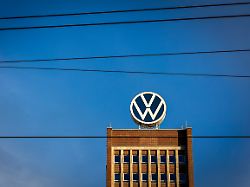The upcoming job cuts are the harbinger of the impending decline at VW: for far too long, the workforce and management of Germany’s most important company have settled into old habits. Wolfsburg is fighting for survival.
What hit Volkswagen employees’ intranet this week was in many ways a declaration of bankruptcy. In rare candor, VW brand boss Thomas Schäfer announced an unpleasant message to the workforce: The Volkswagen brand is no longer competitive with its previous structures, processes and high costs, it was said. At the same time, he announced noticeable cuts: “We have to tackle the critical issues, including personnel.”
Even if it is not yet clear exactly how many jobs should be eliminated, whether partial retirement should play a role, and even if the management’s doomsday rhetoric is of course also a negotiating tactic in the power poker with the unions: It is a breach of taboo that Schäfer and his board colleague Gunnar Kilan announced there. VW boss Oliver Blume, who also happens to be Porsche boss, is threatening to lay the ax to the permanent workforce in Germany. For the first time, jobs are to be permanently eliminated at Germany’s most important industrial group.
It is the largest savings program in Volkswagen’s history. The group wants to save ten billion euros and reduce costs by 20 percent. The car giant is aiming for a radical restructuring because there is no other way to go on. VW must reinvent itself or perish. A few days ago, according to “Handelsblatt”, Schäfer himself said in an internal podcast, Human Resources Director Gunnar Kilan: “We are too slow, too sluggish, too complicated – that is not survivable.” The fact that it has come to this has a lot to do with the fact that management and employees have closed their eyes to uncomfortable truths for too long.
Secure jobs in uncertain times
The most important one is that the company is too expensive and has missed the transition to electromobility for too long. While there was quarreling in Wolfsburg about Christmas bonuses and factory capacity utilization, new competitors have emerged in the USA with Tesla and especially in China, which have long been able to hold a candle to the car giant when it comes to electric vehicles. Despite the upheaval, the car manufacturer continued to offer its workforce benefits that dated back to the 1950s: a generous company collective agreement, the clauses of which the unions defended tooth and nail. Secured by the Prime Minister of Lower Saxony, who co-governed from the sidelines thanks to the VW law.
Co-determination by employees, which at VW has almost amounted to borderline cooperation between management and works councils in many places due to decades of practice (keyword: visits to brothels), was for a long time a guarantee of stability due to the pressure to compromise. But now the system is reaching its limits.
IG Metall and VW works council boss Daniela Cavallo are adamantly insisting on the employment guarantee that they once wrested from management years ago: no redundancies for operational reasons until 2029. It’s as if the automotive world would continue to revolve solely around the wish lists of German union officials – and it wasn’t already light years further. VW may now be facing exactly what the Wolfsburg system always tried to avoid as much as possible: an open conflict between the board of directors and the works council.
Perseverance slogans from the executive suite
But the VW bosses themselves also contributed significantly to maneuvering Volkswagen into a dead end. It has been clear for years that VW has a problem with returns on its core brand. Even under Blume’s predecessor, Herbert Diess, there was an efficiency program to reduce costs. Nevertheless, the margin continues to languish at a measly three percent.
Close your eyes and get through it was the management motto for years. For far too long, the company has continued to focus on expensive premium models instead of cheap entry-level electric cars. And in doing so, they unilaterally put their money on the China map – without developing a plan B for the time when the car manufacturers from the People’s Republic have caught up technologically – and make VW superfluous there. Now this turning point has come. But other than “Forward to Victory,” not much comes from the executive suite.
“There is no argument for us why we don’t develop and manufacture vehicles in China on the same cost basis as our Chinese competitors,” Blume insists on the China strategy in the “FAZ”. The competition from the USA, Japan and France sees it differently. It has long since turned its back on the People’s Republic.
VW, on the other hand, goes one step further. And is expanding the now fateful dependence on China: Blume is moving the development of new electric cars away from Wolfsburg to the People’s Republic. In the future, a separate development center there will decide for the Chinese market, separate from the headquarters.
In fact, Volkswagen already capitulated to a certain extent by joining the Chinese manufacturer Xpeng in the summer. The largest car company in Europe bought into a startup in order to get a piece of the pie in the Far East. Because its cars, which are built with a lot of German engineering but are not digitally networked enough, are expensive slow sellers in China.
This is all the more dramatic because Oliver Blume only became VW boss because things weren’t going well in China – and he set out to change that last fall. Almost a year later, VW is just as weak in the Middle Kingdom. And all Blume can think of so far is to do the red pencil at home in Wolfsburg. Whether the group collapses due to the challenges of the times depends on whether Blume and his opponent Cavallo manage to get rid of old habits that those responsible at Volkswagen have been comfortable with for too long.
